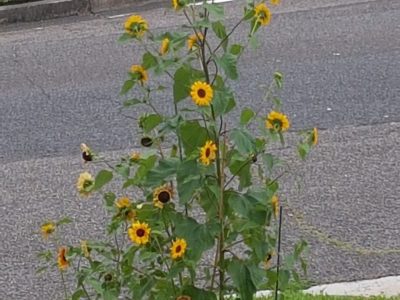Sunflowers and hope
Sunflowers on the street verge (Photo courtesy of Irene Thom).
Late each spring I open a packet of sunflower seeds, place them into egg cartons and nurture them ready for transplanting. Watching them grow and bloom is a joy. They are now in flower on the verge delighting neighbours and especially kids. Their smile in seeing these flowers is one of those little pleasures that I have come to appreciate in otherwise gloomy times. Sunflower beauty early in the year is refreshing and symbolises hope for better times ahead.
To dwell on hope maybe naïve. But despite all the nasty things that beset our lives, there must be hope for the future. Yes, I am optimistic about what lies ahead. The human spirit is boundless. So, I compel myself to look for opportunities for what can be done to improve our coastal lives, not to sit back and complain and be cynical.
On the broader environmental front, I see hope in what some major commercial enterprises are doing to address climate change problems. Even some federal government agencies are striving to act although in a rather depressing political context. My plan in 2022 is to offer whatever support I can to these endeavours. No doubt there will be hurdles to jump over but constructive advice is often sought, so the old 80:20 rule can apply (noting success at 20 may prove invaluable!).
The need for scientific input to provide clarity around uncertainties in modelling becomes important in matters related to environmental health. Communication of assumptions that underpin future forecasts is fundamental to building trust with both private and public sector decision makers. Here I hope that we can find ways to ensure that emerging knowledge is better understood and applied in ways that offer sustained comfort and not division to society.
We are told to assume more “personal responsibility” in our lives and depend less on government intervention. This supposed “neoliberal” view in many ways runs counter to Australia’s colonial and post-colonial history. Successive federal and state governments have “invested” heavily in both physical and social infrastructure for what is intended to be in the “public good”. Of course, private interests benefit along the way. Adverse consequences to the environment often occur even aided and abetted by government action or inaction. Wentworth Group’s experience in water management in the Murray-Darling Basin is full of such stories. I worry that a narrative that emphasises personal responsibility will create milieu where environmental benefits are thwarted adding to long term exposure to degradation. We must be alert to such policies. In a particular case my hope is that the current federal reinsurance pool initiative related to cyclone insurance does not lead to “maladaptive” practices as a result of discounts being offered to property owners for mitigation works in the absence of understanding coastal processes and effective regional plans.
None of us can hide from the challenges of pandemics, climate change, militant actions here and overseas, and all those things that life throws up. We can learn from the past, but the emerging world is not going to be a “new normal”. Planning of whatever type must embrace uncertainties, shifting goal posts and conflict. Those into coastal management recognise we deal with “contested spaces”. Again, I hope we use our knowledge in ways directed to living in harmony with nature and not fighting against it or its exploiters.
As we move into the New Year, time for reflection on last year’s disappointments is over. I hope we can remain positive and appreciate that our services to coastal studies and management will make a difference no matter how small. Those sunflowers are a tiny part of my life. They offer a spark to a renewed desire to be happy and remain committed.
Bruce Thom
Words by Prof Bruce Thom. Please respect the author’s thoughts and reference appropriately: (c) ACS, 2022. For correspondence about this blog post please email austcoastsoc@gmail.com
#207


